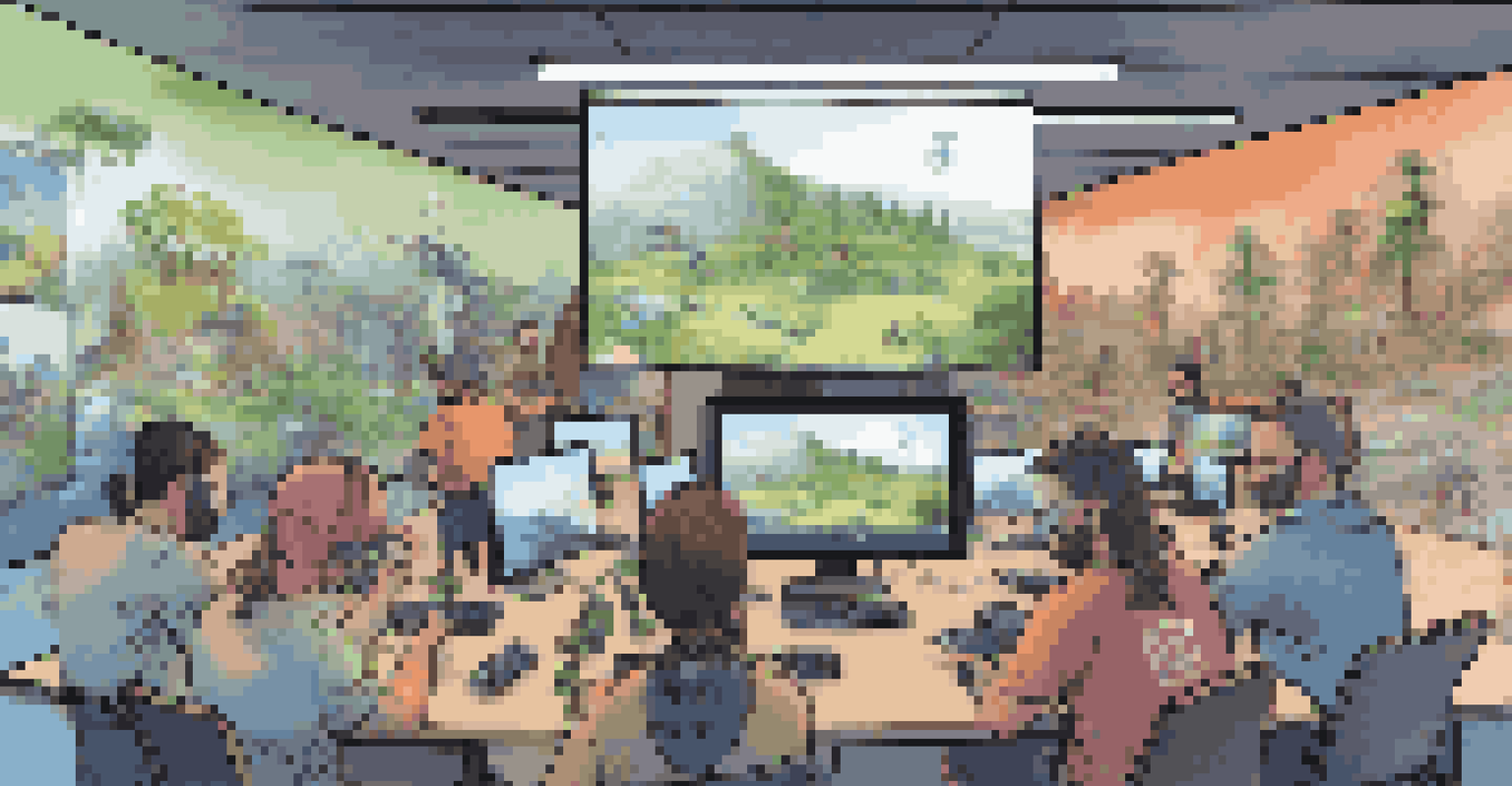Sustainable Software Development in the Gaming Industry

Understanding Sustainable Software Development in Gaming
Sustainable software development refers to creating software in a way that minimizes environmental impact. In the gaming industry, this means considering the entire lifecycle of a game, from development to distribution and beyond. With the gaming industry booming, it’s essential to integrate sustainability into its growth to ensure a healthier planet for future gamers.
We are all in this together, and we all have a role to play in creating a sustainable future.
By adopting eco-friendly practices, developers can reduce waste, conserve energy, and lower carbon footprints. This not only benefits the environment but can also enhance a company's reputation, attracting environmentally-conscious gamers. Ultimately, sustainable software development isn’t just a trend; it's a necessary shift in how we think about game creation.
As more gamers advocate for sustainability, developers are realizing that aligning with these values can foster a loyal community. The intersection of gaming and sustainability is ripe for innovation, with countless opportunities for developers to make a positive impact.
The Role of Energy Efficiency in Game Development
Energy efficiency plays a pivotal role in sustainable software development, especially in gaming. High-performance games often require considerable computing power, which can lead to significant energy consumption. By optimizing code and utilizing energy-efficient technologies, developers can create games that run smoothly without draining resources.

For instance, employing cloud gaming solutions can reduce the need for high-spec hardware, thereby lowering energy use for gamers. Additionally, game engines are increasingly being designed to be more energy-efficient, allowing for stunning graphics without the heavy power draw. This means that both developers and players can enjoy immersive experiences while being mindful of their energy usage.
By prioritizing energy efficiency, the gaming industry can significantly mitigate its environmental footprint. Developers who embrace these practices will not only contribute to a healthier planet but may also see cost savings in the long run, creating a win-win scenario.
Embracing Green Technologies in Game Design
Green technologies are reshaping the landscape of game development, offering innovative solutions that reduce environmental impact. These technologies can range from energy-efficient servers to sustainable materials used in physical game merchandise. By integrating such technologies, developers can take significant strides toward sustainability.
The greatest threat to our planet is the belief that someone else will save it.
For example, utilizing virtual reality (VR) and augmented reality (AR) can minimize the need for physical products, thereby reducing waste. Games designed with these technologies often encourage players to engage with virtual environments instead of the physical world, promoting sustainability through digital experiences. This shift not only helps the environment but also enhances creativity in game design.
Moreover, as green technologies continue to evolve, developers will have more tools at their disposal to create engaging, sustainable gaming experiences. The future of gaming is not just about entertainment; it's about making responsible choices that contribute to a sustainable world.
Creating Sustainable Game Playthroughs and Experiences
Sustainable gameplay experiences can be crafted by incorporating themes of environmental conservation and social responsibility. By embedding these elements into the narrative, developers can raise awareness and encourage players to think critically about their impact on the planet. Games like 'Eco' and 'Cities: Skylines' allow players to build sustainable communities while exploring environmental challenges.
Moreover, developers can promote eco-friendly practices within the gaming community by creating in-game events or challenges that encourage players to plant trees or participate in clean-up drives. This not only enhances player engagement but also fosters a sense of community around sustainability. It’s a creative way to connect gameplay with real-world actions.
As players become more conscious of their choices, developers have an opportunity to influence the next generation of gamers. By making sustainability a core aspect of gameplay, the industry can inspire players to take action and make a positive difference in their own lives.
The Impact of Digital Distribution on Sustainability
Digital distribution has transformed how games are delivered to players, significantly reducing the environmental impact associated with physical copies. By eliminating the need for packaging and shipping, developers can cut down on waste and carbon emissions. Platforms like Steam and the Epic Games Store have made it easier for players to access games without the environmental cost of traditional retail.
Not only does this save resources, but it also promotes a more streamlined gaming experience. Players can download games instantly, and developers can roll out updates and patches more efficiently. This shift towards digital distribution is a clear example of how technology can align with sustainability goals in the gaming industry.
As digital distribution continues to grow, it will be crucial for developers to prioritize eco-friendly practices in their online offerings. By focusing on sustainability at every stage of the distribution process, the gaming industry can further its commitment to a greener future.
Collaborating for a Sustainable Gaming Future
Collaboration among developers, players, and environmental organizations is key to fostering a sustainable gaming future. By sharing resources, knowledge, and best practices, the industry can amplify its impact on sustainability. Initiatives like the Green Game Jam encourage developers to create games that promote environmental awareness, demonstrating the power of collective action.
When developers come together to tackle environmental challenges, they can create a ripple effect throughout the industry. This collaboration can lead to the development of new tools and technologies that further reduce the ecological footprint of gaming. Players, too, can play a role by supporting games that prioritize sustainability and advocating for eco-friendly practices.
The gaming community is a vast network, and when everyone works together, the potential for change is immense. By embracing collaboration, the gaming industry can pave the way for a brighter, more sustainable future for all.
The Future of Sustainable Software Development in Gaming
As the gaming industry evolves, so too does the approach to sustainable software development. Developers are increasingly recognizing the importance of sustainability, and this awareness is shaping future projects. The goal is not just to minimize negative impacts but to create games that actively contribute to a healthier planet.
Emerging trends suggest that we will see more games that incorporate environmental themes, promote eco-friendly behaviors, and utilize sustainable technologies. This shift will not only appeal to environmentally-conscious gamers but also drive innovation within the industry. As sustainability becomes a core value, it will influence everything from game design to marketing strategies.

Ultimately, the future of sustainable software development in gaming looks promising. By prioritizing eco-friendly practices, the industry can lead by example and inspire other sectors to embrace sustainability as a fundamental principle.